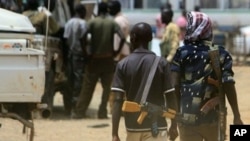As north and south Sudan agree to a troop withdrawal in the disputed region of Abyei, the International Crisis Group is warning that rising tensions in the region could threaten the broader peace as Sudan prepares for its July split.
In an effort to quell clashes between armed groups and security forces in Sudan’s oil-producing Abyei region, the governments of north and south Sudan began to withdraw forces from the area Tuesday, turning control over to a jointly operated force.
A statement released late Sunday by the United Nations said representatives from the two sides had agreed to remove "all unauthorized forces" from the region.
Abyei straddles the border between north and south Sudan and has been a hotly contested region ever since the signing of the Comprehensive Peace Agreement, which ended more than 20 years of civil war.
The CPA called for a referendum to be held in Abyei to determine its status, alongside the January referendum which created an independent south Sudan. But disputes over border demarcation and voter eligibility have postponed the process indefinitely, further inflaming tensions.
With south Sudan preparing to officially secede from Khartoum on July 9, the International Crisis Group’s Zach Vertin says the Abyei issue will be crucial in ensuring a smooth transition.
"There are definitely broader implications as further deterioration in Abyei presents not only grave risks for the people in Abyei but could inflame north-south proxy conflicts elsewhere, threaten peaceful secession of the south in July and undermine efforts toward a constructive north-south relationship beyond July 2011," Vertin said.
Abyei is inhabited by members of the Ngok Dinka, a group affiliated with the south. But the region is also claimed by the northern-affiliated Misseriya tribe as a traditional grazing area. Clashes between the two groups in the lead-up to the referendum led both north and south Sudan to build up their troop deployments in the area.
Last week, 14 people were killed when fighting broke out between the two sides. The Brussels-based Crisis Group warns that the clashes have pushed north and south Sudan to the brink of war.
Both sides have also laid unilateral claims to the region, with north Sudan even threatening to withhold recognition of the south come July.
With tensions running high, the prospects of an actual referendum to decide the fate of Abyei look dim.
According to Vertin, there is momentum for a political settlement fueled by progress in broader post referendum talks over oil, citizenship and borders.
"There certainly have been put forward solutions that could solve the Abyei issue among political elites in Khartoum and Juba," Vertin said. "But what’s necessary for sustainable peace is selling that on the ground to the Ngok Dinka and Misseriya communities."
For now, security in the Abyei region will be maintained by the Joint Integrated Unit, a force created by the CPA with elements of both the north's Sudanese Armed Forces and the south's Sudan People’s Liberation Army. The joint force is considered a largely failed component of the peace agreement but was seen as the only viable and immediate solution to the escalating violence.
Crisis Group: Sudan at 'Tipping Point' Over Abyei Clashes




